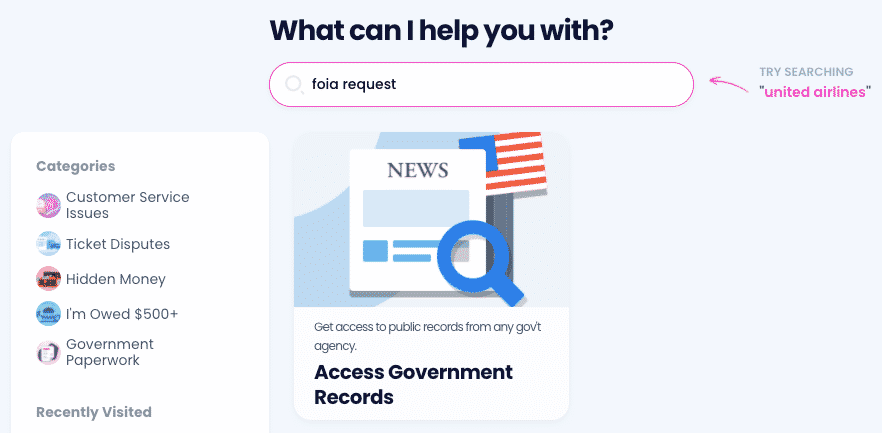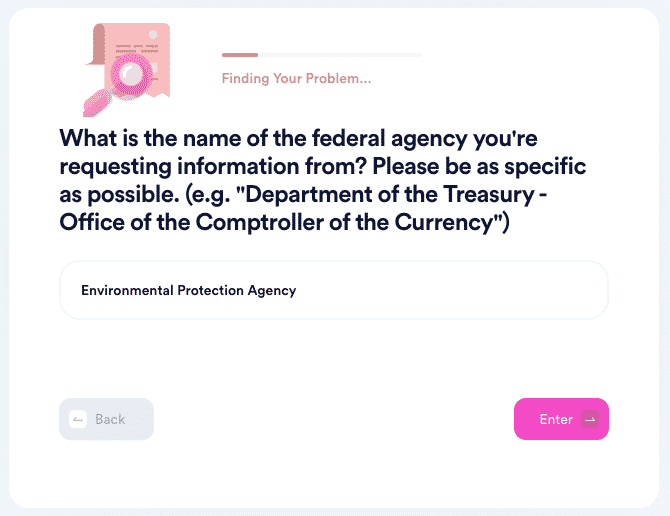The Breakdown of the FOIA Fees
Submitting a FOIA request doesn’t come without charges. Whether you want records from the CIA, FDA, ICE, or any other federal agency, you must cover the expenses of searching, reviewing, or copying the desired documents.
You don’t have to dread the FOIA fees! In many cases, they depend on your ability to be specific about the documents you need. If you want to receive desired information in record time and reduce the fee as much as possible, DoNotPay can help!
What Constitutes Freedom of Information Act Charges?
The Freedom of Information Act of 1966 allows citizens and organizations to access federal agencies' public records. Federal agencies must disclose every record that doesn’t fall under law-specified exemptions or exclusions. You can’t access any document that can endanger personal privacy, national security, or law enforcement proceedings.
If a federal agency accepts your request, you will have to pay an established fee. The cost varies mostly according to:
- Complexity and volume of the request
- Service the agency provides
- Requester category
What Are the FOIA Request Services?
Processing FOIA requests demands certain steps. The course of delivering your documents involves:
- Search—The fees for manual and computer searches depend on the qualifications and pay grade of the personnel conducting the search, and they usually range from $21 to $76 per hour
- Review—The reviews are charged by the hour, typically for commercial requesters
- Duplication—Duplication is usually charged after 100 pages at $.15 per page
What Are the FOIA Fee Categories?
Based on the fees, the FOIA recognizes a few requester categories. Federal agencies estimate the charge of their services according to the requester’s category. Take a look at the table below to find your category and the fees you may be facing:
| Requesters | Description | Typical Charges per Category |
|
Commercial use requesters | Requests related to commercial, trade, or profit interests | Searching, reviewing, and duplication of documents |
|
Media news representatives | Any person actively gathering information for an organization that broadcasts news to the public—radio, television, periodicals | Duplication after 100 pages |
|
Educational institution requests |
| |
|
Non-commercial scientific institution requests | An institution that conducts non-commercial scientific research | |
|
Other requesters | Requesters that don’t belong to any of the above-mentioned categories | Search after the first two hours
Duplication after 100 pages |
Can I Reduce FOIA Costs?
When you make a FOIA request, you automatically agree to pay the fee up to $25. If the charges exceed that amount, the federal agency will notify you and allow you to modify your request to lower the cost.
You don’t have to pay anything in advance. Federal agencies usually estimate the charges after receiving and processing your request.
You can specify the sum you are willing to pay in your FOIA request letter. The agency will inform you if the estimated amount exceeds that price so that you can reconsider your request.
Can I Apply for a FOIA Fee Waiver?
Under the FOIA, you may request a fee waiver under special circumstances.
You are qualified for a fee waiver if you meet these two criteria:
- The release of the document you need is not for commercial use
- The record you are seeking contributes to the public understanding of government actions
If you are seeking records on yourself, you are probably not eligible for a fee waiver. Federal agencies normally don’t grant fee waivers based on the requester’s inability to pay.
How Does a FOIA Request Letter Influence the Fee?
Writing a FOIA request letter is a serious undertaking. While different federal agencies may provide specific instructions, templates, or online request forms to help you, they all require you to be as specific as possible in your request.
Sending a vague description of the record you seek will end up costing you more than necessary. It can result in the agency denying your request under the pretext that they can’t find it. Without enough information, agencies spend a lot of time searching for your document, which results in a higher fee.
You can avoid that by providing as many details as you can. Make sure to include dates, names, and anything else that can shorten the search time.
If you feel like writing a request letter by yourself is too much trouble, we offer an easy solution—DoNotPay!
How To Submit a Top-Notch FOIA Request Letter With DoNotPay
DoNotPay has created a nifty feature that will ensure your request letter is to the point! If writing FOIA request letters is not your thing, you can provide some essential information, and we will draft and send one for you.
All you need to do is open DoNotPay in your and:
- Enter FOIA in the search field
- Type in the agency name
- Indicate whether you’d like a fee waiver or expedited processing
While the FOIA applies to federal agencies, you can use our app to submit requests to state and local agencies as well!

Explore our knowledge base for more guides on how to check your FOIA status, file a FOIA appeal, or file a FOIA request on yourself. Use to learn about the meaning of FOIA and gain more clarity on the subject. Some agencies will allow you to make a request using the FOIAonline website, and we can show you how that method works!

DoNotPay Leads the Way Against Spammers
Browsing the internet has never been more popular than today, but you must not forget to keep your private and financial information safe. You know you can cancel any streaming service or magazine subscription easily, but that won't stop them from using your personal details for marketing purposes.
DoNotPay has a solution for that!
Is a company pestering you with incessant robocalls, spam emails, and text messages? Use our Virtual Credit Card to catch them in the act and claim compensation for your troubles.
To prevent that from happening ever again, use our card to sign up for free trials—not only will you not pay a dime for the service, but you will be automatically unsubscribed as soon as the trials are up!
If you want to avoid revealing your personal phone number, we'll generate a temporary burner phone for you so the company won't have any way to reach you.
Already Been Scammed? DoNotPay Knows the Way!
If you've already made the mistake and divulged your personal info to the wrong party or experienced any other kind of crime or injustice, you don't have to sit tight and suffer the consequences. DoNotPay can assist you in taking anyone to small claims court!
We'll help you gather evidence—correspondence proving stalking or harassment took place, customer service call recordings, denied chargeback and refund claims, online fax transcripts, or proof of copyright violation. Then, we'll fill out the relevant documents for you and draft a court script that you can use in your hearing.


